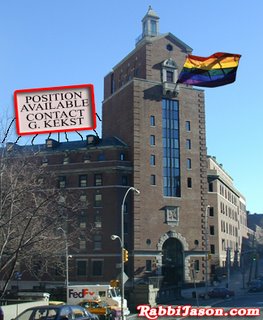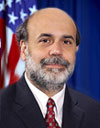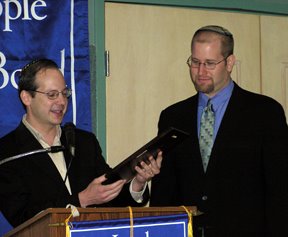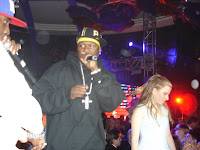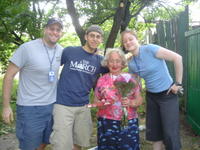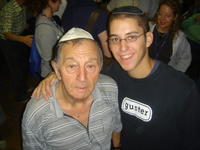A Manifesto for the Future
Drop ‘Conservative’ Label to Tap True Meaning and Reach the Faithful
by Rabbi David Wolpe
In early November, I spoke at the Jewish Theological Seminary in New York. The topic was “The Future of Conservative Judaism.” I prepared for the talk by asking colleagues, friends and congregants to define Conservative Judaism in one sentence. It was a dispiriting experience.
Some had no answer at all. Others found themselves entangled in paragraphs, subclauses and a forest of semicolons. Sensible people began to sound like textbooks.
Many of us have learned that Conservative Judaism is either a complex ideology (at least we never get a straightforward explanation) or simply a movement that stands in the center between Reform and Orthodoxy. An early classic of Conservative Judaism was titled, “Tradition and Change,” but tradition and change is a paradox, not a banner of belief.
Conservative Judaism is crying out for renewal and revitalization. Some of the most spiritually charged, socially sensitive prayer groups and institutions in the country choose to not affiliate themselves with the Conservative movement. Yet they are led by rabbis ordained by the Conservative movement and attended by congregants who grew up in that movement.
In synagogues that do define themselves as Conservative, the congregants often expect halachic observance from their rabbis, yet they are not moved to emulate them. Conservative Jews are increasingly confused and uncertain about their spiritual direction.
As I posed these problems and questions, some turned the question back to me.
“Who are you, and what do you believe?”
When I reflect upon the beliefs with which I was raised and how I have grown in my faith, I realize that the word “Conservative” does not best fit who I am and what I believe.
I am a Covenantal Jew.
Covenantal Judaism is the Judaism of relationship. Three covenants guide my way — our way: The covenant at Sinai brings us to our relationship to God, the covenant with Abraham to our relationship with other Jews and the covenant with Noah to our relationship with all humanity.
First Covenant: Relationship to God
The Jewish relationship to God may be seen as a friendship, a partnership, though of obviously unequal partners. In the Midrash, God swears friendship to Abraham, is called the “friend of the world” (Hag. 16a) and even creates friendships between people (Pirke D’Rabbi Eliezer). Friendship is one aspect of the Divine-human connection.
The Torah speaks of God as a parent, a lover, a teacher and an intimate sharer of our hearts. When we speak of friendship or partnership, all of these relationships and more must be understood.
The terms of all friendships are fixed by history — we define our partnerships by our memories. One friend can speak a single word, “Colorado,” and the other knows that the word refers to a trip taken together 15 years before. However, vital friendships do not dwell solely in the past. They are always creating new memories, entering new phases and enriching what has gone before.
Some Jews believe that everything important in the friendship between God and Israel has already been said. The Torah, the Talmud, the classical commentators and codes have said all the vital, foundational words. Our task now is simply to fill in a few blanks, but otherwise the work is done. We are the accountants of a treasure already laid up in the past.
This is not a covenantal understanding. It is a Judaism frozen in time, as though all the clocks stopped in the 18th century.
Conversely, there are those who think the past weightless, because times have so radically changed. This is a friendship that tries to recreate itself each day, dictated by the demands of the moment. While the past is acknowledged, it is seen largely as something to be overcome, not to be cherished and integrated into the present. This creates a relationship with predictably thin and wan results.
Covenantal Judaism believes in the continuous partnership between God and Israel. When we light Shabbat candles, God “knows” what we mean — we have been doing it for thousands of years. It is part of the grammar of relationship. Our past is the platform from which we ascend. The covenant at Sinai is the first, reverberating word.
Yet there is so much more to say. There is no reason why someone as wise and important as the Rambam (who lived in the 12th century) could not be born tomorrow. This person could both incorporate Rambam’s teachings and move beyond them. There is no reason why something as epochal as the Exodus could not happen next year — witness the creation of the modern State of Israel.
Each day, we tremble with the anticipation of something new and powerful on the horizon. Each night, we pray with the awareness that the yearning of the generations sanctifies our words. We create new rituals because today must not only stand upon yesterday but must reach toward tomorrow.
The classical Jewish view teaches “the decline of the generations” — since Sinai we have grown further from revelation and stand, as a result, on a lower level of holiness. This is not a true covenantal understanding. The covenant does not fade or weaken with time. Our future is as promising as our past is powerful.
For the Covenantal Jew, dialogue between the Jewish people and God began in the Bible and continues today. The Bible is, as Rabbi A.J. Heschel put it, the record of the search of human beings for God and of God for human beings.
Second Covenant: Relationship Between Jews
All Jews are involved in the Abrahamic covenant — not only those Jews whom we like or those of whom we approve but all Jews.
Jews have always fought within our own community, and undoubtedly, we always will. Devotion to Torah does not free us from the constraints of human nature.
Still, a Covenantal Jew seeks active dialogue with Orthodox, Reform and Reconstructionist, as well as secular Jews. The covenant does not depend upon movements or ideologies; it is a covenant of shared history and shared destiny.
The emphasis on the responsibility of Jews to other Jews is uncomfortable for some. It seems parochial and ungenerous.
However, we are built to care in concentric circles: first one’s own family, then one’s community and then larger groups — rippling out to the world, always modified by the degree of need. Aniyei ircha kodmim teaches the Talmud: Care first for the poor of one’s own city.
Pallid universalism is not an ideal but a disaster. Too many Jews remind me of Charles Dickens’ Mrs. Jellyby in “Bleak House,” who is always charging off to do good works, while neglecting her own wretched children at home.
I remember when I was teaching at Hunter College in New York, a student approached me and asked: “Today there is an anti-apartheid rally and a rally for Soviet Jewry. I’m planning to attend the anti-apartheid rally. Can you give me a good reason to go to the Soviet Jewry rally?”
“Yes,” I answered. “If you attend the anti-apartheid rally, who will go to the Soviet Jewry rally?”
There are Jews who simply shun large parts of the Jewish world that do not meet their expectations. On both the right and the left, many simply ignore or discount the other side of the religious or political spectrum. But Republican or Democrat, Satmar or secular, affiliations invalidate neither God’s covenant nor our ties to one another.
This sense of Jewish responsibility explains why Solomon Schechter, the first major figure of American Conservative Judaism, was an outspoken Zionist. Ahavat Yisrael, love of Israel, is not an emotional impulse but a covenantal responsibility. That is why Covenantal Judaism is passionate about the land of Israel and the people Israel.
Covenantal Jews give priority in caring to our own, but we do not care exclusively for our own.
Third Covenant: Relationship With the Non-Jewish World
The first covenant was not made with the Jewish people. God sent a rainbow in the time of Noah as a sign to the world, to all of humanity. Noah lived 10 generations before the first Jew.
The meaning is clear: We have a responsibility toward others of whatever faith; we have a covenantal relationship to the non-Jewish world.
The very first question in the Bible is a question God asks of Adam — “Ayecha” — Where are you? This is not a literal question but a spiritual one, a question God asks us at each moment in our lives.
The second question in the Bible is in a way an answer to the first. The second question is one that human beings ask of God. Cain turns to God and asks, “Am I my brother’s keeper?”
If you answer that question, you will know where you are. Do you care for those who are in need, those who are anguished and alone?
Jewish World Watch has organized our response to the calamity of Darfur. Jewish leaders have shouted to the world, bringing attention to genocide in Cambodia and Rwanda, and championed the recognition of the Armenian genocide. These and countless similar causes and efforts are not strategic or to reflect credit on ourselves. They are sacred Jewish obligations. Jews who care for the Jewish community alone are neglecting the first, most comprehensive covenant.
Sadly, many traditional Jewish communities seem to have little concern for the non-Jewish world.
The rabbis of the Talmud insist that compassion is a characteristic of the people of Israel. The first statement about human beings is that each is made in God’s image. Invidious comparisons between the worth of Jews and others are not only malignant but fundamentally at odds with the Covenantal tradition.
Jews receive as well as give to those outside the Jewish community. Covenantal Judaism is eager to learn wisdom — not only practical but spiritual — from the non-Jewish world.
Judaism has many precedents for religious learning from non-Jews, beginning in the Bible. The world begins with Adam, not with Abraham. Noah, the first man called righteous, is not a Jew.
The chapter of Torah containing the Ten Commandments is named “Yitro” (Jethro) — this central chapter containing the revelation from Sinai is named after a non-Jew. The traditional response when someone asks after our welfare, “baruch Hashem” (praise God) is mentioned three times in the Bible. All three times it is said by a non-Jew: Noah (Genesis 9:26), Eliezer (Genesis 24:27) and Jethro (Exodus 18:10). Thus, even when we praise God, we do it in words that were first spoken by those in our community who were not raised as Jews.
The list could be easily multiplied throughout Jewish history: Maimonides learned from the Islamic scholar Averroes, Kabbalah learned from Sufi mysticism, Heschel learned from Reinhold Neibuhr. Covenantal Jews glory in this interchange, which is not threatened by the insights of others but enriched by them.
The Covenant and Jewish Law
The overriding commandment of Covenantal Judaism is to be in relationship with each other and with God. The more halacha (Jewish law) we “speak,” the more full and rich the relationship. Our faith is neither a checklist nor a simple formula. It is a proclamation and a path.
Changes in Jewish law to include women, from bat mitzvah celebrations to rituals for miscarriage, as well as changes that enable people to drive to synagogue or use instruments in the service as our ancestors did, are elements in a covenantal understanding of the tradition. This is a tradition not rigid but responsive and alive, not repetitious but committed to dialogue with the past, each other and God.
Dialogue with God is not an act of chutzpa, not a conviction of equality. Rather God ennobles us by choosing us as partners for dialogue.
Abraham argues with God; Moses opposes God’s decree, and throughout Jewish history, in medieval poetry and modern literature, Jews insist that God wants not puppets nor robots but human beings who bring their passion, confusion and love to the task of Israel, which in Hebrew means wrestling with God.
Jewish authenticity is not measured by the number of specific actions one performs but the quality of the relationships expressed through those actions. Recall what the Torah says of Moses: In praising our greatest leader, The Torah does not recount that he performed the most mitzvot of anyone who ever lived, or even that his ethics exceeded all others. We are told that Moses saw God “panim el panim” face to face. The merit of Moses is in the unparalleled relationship he had with Israel and with God.
The Covenant and the Future
When the covenant is first presented to Noah, God promises not to destroy the world. In that promise is a chilling omission: God does not promise that we will not destroy the world.
As Rabbi Joshua of Kutna points out, the rainbow is a half circle. That is God’s promise to us. God’s half must be completed by our own intertwining colors.
The relationships we build through sanctity, compassion and love are our reciprocal rainbow. Involving all colors, embracing our community and beyond, it teaches us that in covenant is the secret of salvation.
Covenant is the spine of Judaism. No idea is more important to the development of the tradition. Conservative Judaism, as it has grown, has taken the covenantal idea seriously, sometimes without even realizing it. The time has come to claim it, to develop it in powerful and new ways and to fashion a movement of Judaism that can change Jewish life in America and beyond.
Conservative Judaism remains a large and important international Jewish organization of synagogues, schools, camps, youth groups, adult organizations and centers of training for scholars and clergy. By placing covenant at the center of this worldwide Jewish initiative, we will be reframing the enterprise of creating a Judaism that closes the door neither to the past nor to the future. Such openness and conviction are vital for the future of the Jewish people, a covenanted nation born of passion for improving this world under the sovereignty of God.
This is the time for Covenantal Judaism.
(c) Rabbi Jason Miller | http://blog.rabbijason.com | Twitter: @RabbiJason | facebook.com/rabbijasonmiller
